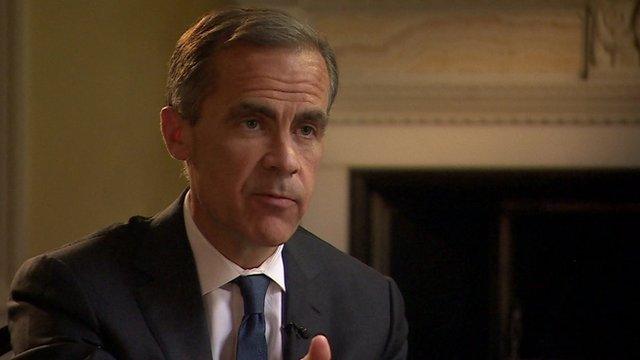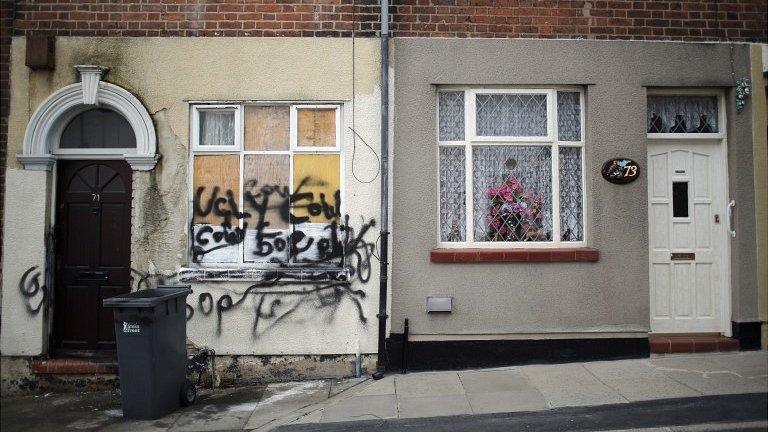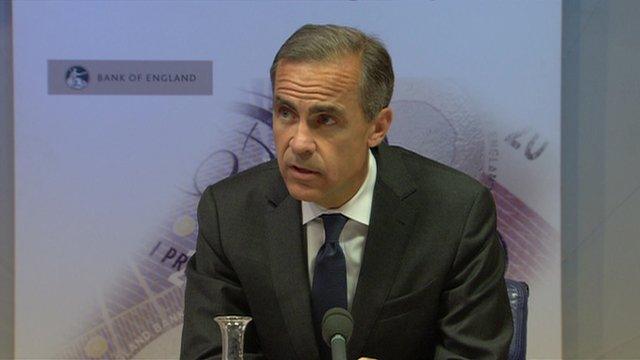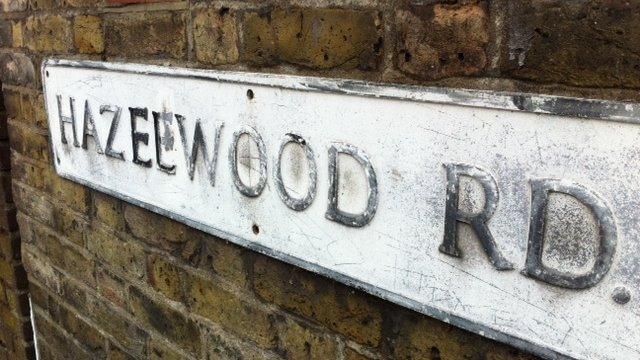Mortgage cap 'insures against housing boom'
- Published
Bank of England governor Mark Carney tells Robert Peston he wants to stop a "mass of people moving into riskier mortgages"
Plans by the Bank of England to cap riskier mortgage lending have been hailed as an important "insurance policy" for the UK economy.
Under the proposal, lenders will not be allowed to lend any more than 15% of residential mortgages at more than 4.5 times a borrower's income.
The move will have little initial short-term impact on people's chances of getting a home loan.
But commentators have said the measure could have "bite" in the future.
Protection
The Bank's Financial Policy Committee (FPC) has a remit to tackle any threat to the stability of the UK's economy and the measures aim to prevent the housing market getting out of control in the future, and stop individuals getting into unsustainable debt.
The key recommendations are:
Ensuring lenders check mortgage applicants can cope with a three percentage point rise in interest rates - slightly tougher than current affordability checks
From October, limiting risky lending by putting a 15% cap on the number of mortgages that banks and building societies can give to people who want to borrow more than 4.5 times their income
Separately, the Treasury has said it will ban anyone applying for a loan through the Help to Buy scheme borrowing any more than 4.5 times their income
Lenders described the tool used by the Bank as a spirit level for financial and economic stability, which must not be seen as a proxy for the government's housing policy.
Future-proofing
The Bank said that the plans would not have an immediate effect on the current housing market, and would not suddenly harm a potential buyer's ability to get on the property ladder.
The Bank's governor, Mark Carney, said the threat to economic stability was not imminent, but lending could turn from responsible to reckless very quickly. The 15% limit could be reached nationally within a year, he added.
"The 15% cap... could quickly become relevant if house prices grow more than we expect, if incomes grow less rapidly than we expect, or if underwriting standards slip," he said.
Mr Carney said that the Bank was acting in a proportionate and graduated way, acting early, and putting in place "a fire-break" on riskier lending.
There is a North-South divide in house prices, as Adam Parsons and Steph McGovern report.
The announcement signalled that the Bank was prepared to use its powers to insure against the risk of an overheating housing market, according to Andrew Tyrie, chairman for the Treasury Committee of MPs.
"The more the market were to overheat, the more this measure could bite," he said.
This, he said, was a "major departure" for the central bank in the UK.
Simon Rubinsohn, chief economist at the Royal Institution of Chartered Surveyors (Rics), said that more action could be expected if the housing market did not cool down as the Bank of England expected.
"In other words, if the Bank's central view is wrong, this is just the beginning," he said.
Divide in prices
Lenders said the cap on higher loan-to-income lending would have an impact primarily in London.
"Nationally, 9% of new loans are at 4.5 times income or more, but the figure is 19% in London," said Paul Smee, director general of the Council of Mortgage Lenders.
"If we read between the lines, the Bank is hinting it will be keeping a beady eye on the London market."
The latest official figures on the housing market showed an annual property price increase of 18.7% in London, where a small proportion of buyers pay in cash.
Baroness Jo Valentine, chief executive of London First, which represents various property firms, said: "If anyone thinks these tighter rules on mortgage lending will somehow make London prices more reasonable then they are mistaken."
And she added: "Trumping everything is the issue of supply and demand - we are building less than half the houses we need each year. Until we take the necessary steps to change that, London will remain a very expensive place to live."
Excluding London and the South East of England, the cost of a home was 6.3% higher in April than 12 months before, the Office for National Statistics (ONS) said last week.
But various surveys have suggested that the heat might be coming out of the market, with mortgage approvals - a sign of future sales - having slowed in recent months. Some areas outside of London and the South East have seen relatively little increases in activity among buyers and sellers.
Lenders are already using new affordability checks - known as the Mortgage Market Review - which test people's ability to repay were interest rates to rise.
This will be added to, under the Bank of England's plans, as lenders will need to assess if borrowers could still afford to repay their mortgage if interest rates were three percentage points higher, during the first five years of the term, than at the time the loan was approved.
Shares in housebuilders rose during trading shortly after the Bank's announcement.
The interactive content on this page requires JavaScript
- Published26 June 2014

- Published26 June 2014

- Published26 June 2014

- Published9 July 2020

- Published3 June 2014

- Published20 May 2014

